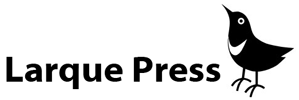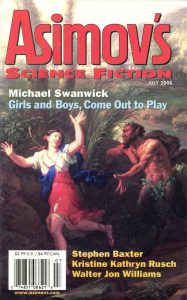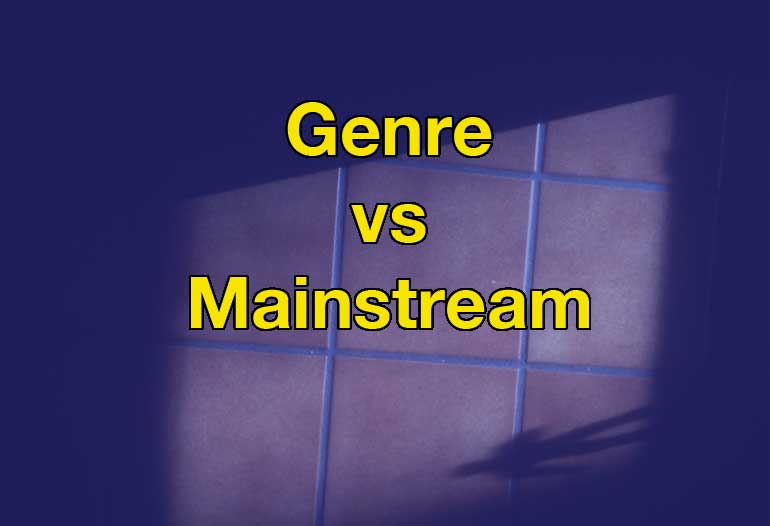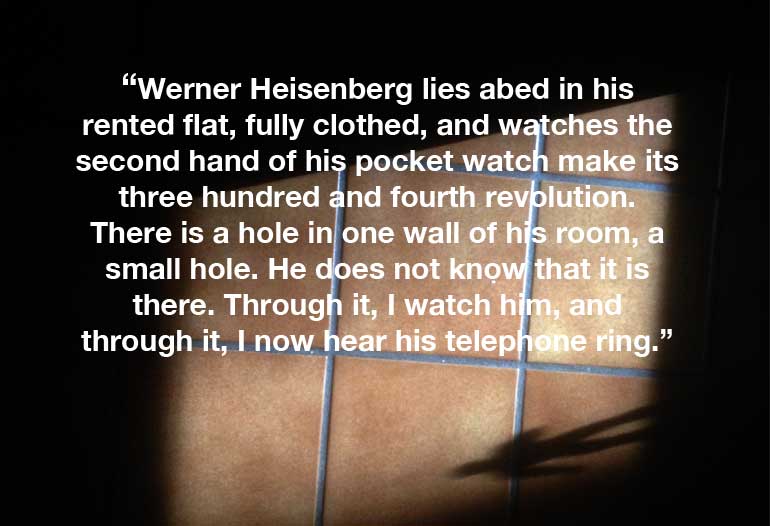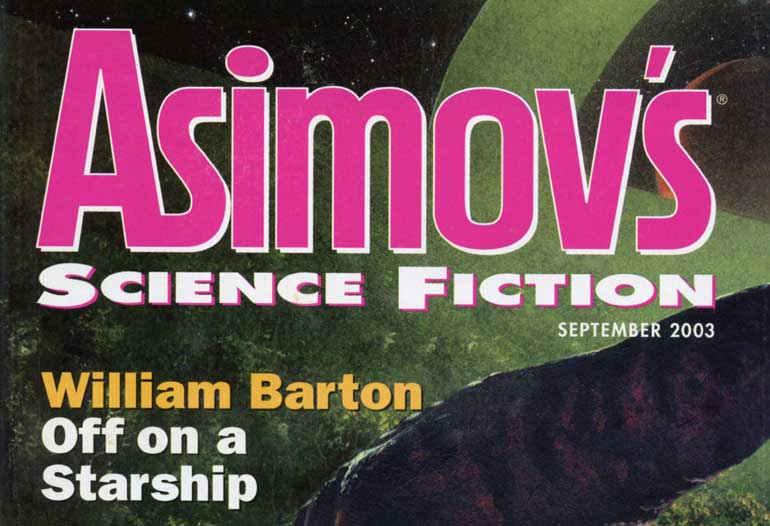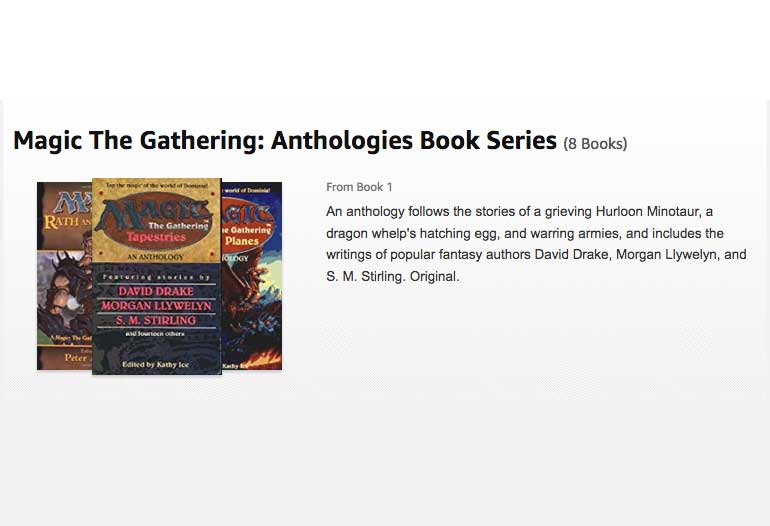Science Fiction writer Edd Vick gave D. Blake Werts a terrific interview for The Digest Enthusiast book six. He also gave us a list of Speculative Short Fiction Markets, which appears in the issue. You can download a PDF file of that page here.
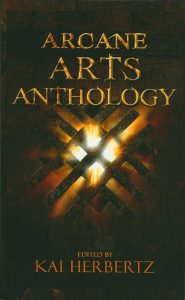
Edd Vick’s comments on genre fiction, an excerpt from the interview conducted by D. Blake Werts, for The Digest Enthusiast book six:
“Mainstream writers start with character. Genre writers start with situation. That’s why people who mostly read genre stories can get bored and think too little is happening in a mainstream novel, just as a mainstream reader gets whiplash and feels there’s too little character development in a genre novel. This is a hugely gross generalization, and of course every writer comes up with their own melding of the two. It’s a continuum.”
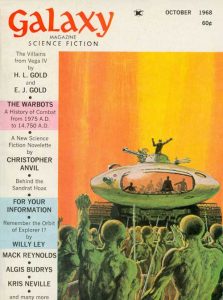 Below are Edd Vick’s comments on digest magazines, from the interview conducted by D. Blake Werts, for The Digest Enthusiast book six:
Below are Edd Vick’s comments on digest magazines, from the interview conducted by D. Blake Werts, for The Digest Enthusiast book six:
When I was in high school I read all the digests I could lay my hands on, preferring one that’s no longer around named Galaxy. Where Analog tended to have more tech-oriented stories, and Fantasy & Science Fiction was usually more literary, Galaxy hit a sweet spot of SF focusing on characters and the soft sciences. I have a complete collection still, barring a couple of later magazine-sized issues from when it was being passed from one publisher to another.
The magazine nowadays that’s inherited that mantle is Asimov’s, where I’m very happy to have sold several stories. They’re a little more adventure-oriented, but that’s not an issue where I’m concerned.
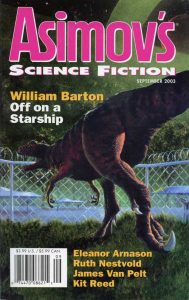
Opening Lines from “First Principles” by Edd Vick, Asimov’s Sep 2003 as featured in the author’s interview with D. Blake Werts in The Digest Enthusiast book six.
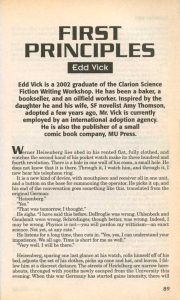
Below are Edd Vick’s comments on critique, from the interview conducted by D. Blake Werts, for The Digest Enthusiast book six:
“First, the more I critique other people’s work, the better I’m going to get at revising my own work. There are three levels of looking at a story. At the highest is to see it as a whole: is the idea interesting? Are the characters well chosen? Does the plot make sense? Is there a compelling theme? The middle level considers each scene: does some character change in some vital way from the beginning to the end of the scene? What is the emotional turn? How is tension ratcheted up or released? At the root level there are the individual paragraphs: is the language suited to the story? If alliteration or other clever manipulations of words are used, are they well-used? Sentence fragments? If so, appropriately used? A masterpiece is going to excel at all three levels. When I’m critiquing, I have to pay some attention to all three levels of storytelling, just as I have to when I’m writing.
“Second, critiquing is a give-and-take economy. If I don’t care enough to do a good job reviewing someone else’s story, why would they put themselves out to critique mine? Plus, I just don’t want to half-ass it; the world needs more good fiction.
“And last, giving critiques is a way of paying it forward. Writers like Joe Lansdale and Ardath Mayhar corresponded with me when I was a beginning writer, giving me useful advice. I’ve been going to science fiction conventions for decades where I can talk to great authors or attend informative panel discussions. When I critique at a con or when I appear on panels, it’s to help the next generation of writers.”
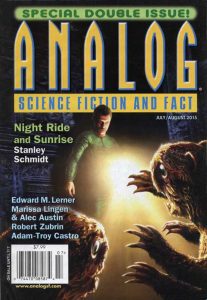 Excerpt from the Edd Vick interview, conducted by D. Blake Werts, for The Digest Enthusiast book six:
Excerpt from the Edd Vick interview, conducted by D. Blake Werts, for The Digest Enthusiast book six:
“He [Manny Frishberg] and I are in the same writing group, Sound on Paper. We meet once a month to critique stories each of us has written in the meantime, be they novels or flash, or whatever—even nonfiction occasionally. A few years ago Manny and I started getting together once a week to write stories. In three years we wrote sixteen stories, and sold half of them. That includes two sales to Analog, the biggest magazine in the field.”
“Tenéré” by Manny Frishberg and Edd Vick, Analog May/Jun 2017, cover design by Victoria Green
“Ashfall” by Manny Frishberg and Edd Vick, Analog Jul/Aug 2015, cover by Tomislav Tikulin
Excerpt from the Edd Vick interview, conducted by D. Blake Werts, from The Digest Enthusiast book six:
“In 2007, one of my Clarion mates, Rudi Dornemann, started a website to publish a new flash fiction story every weekday by a rotating set of authors. I think there were seven or eight of us to start; we added a few others in the following years. I wrote ninety stories for The Daily Cabal, some better than others, but it was a useful exercise in hitting deadlines because if I didn’t get a story in on time, we were in trouble. Well, practically speaking there would be somebody else’s story in the queue, but I’m happy it never came to that.
The Cabal never got enough traffic, so it died after a few years, but there were some damn good stories in it.

Excerpt from the Edd Vick interview, conducted by D. Blake Werts, from The Digest Enthusiast book six. This segment covers part of Edd’s path to going pro:
My first step was to dust off a couple of my old stories and submit them with an application to the Clarion Science Fiction and Fantasy Writing Workshop, which I attended in 2002.
Clarion is a six-week course, with a new instructor every week. To get in, prospective students send in two stories and an application fee. The workshop’s coordinators read the stories, looking for students with potential, but also will rule out anybody whose stories are so good they probably wouldn’t get as much out of Clarion. Accepted students pay their tuition, put their affairs in order, and escape the real world for a month and a half.
At the time, there was Clarion, and then there was Clarion West, which is in my home town of Seattle. My wife, who graduated Clarion West in 1984, said I should choose Clarion, because if I stayed in town I’d be too tempted to deal with mundane life, including helping parent our daughter, who was three at the time. So, I applied, I was accepted, and I went to the University of Michigan for six weeks.
Our instructors were Patricia Wrede, Terry Bisson, Leslie What, Geoff Ryman, the editor Patrick Nielsen Hayden, Tim Powers, and Karen Joy Fowler. That adds up to seven, and I said one instructor per week. Patrick was an extra added attraction for week five, and Tim and Karen shared the last two weeks. The first teacher or two cover the basics, and each succeeding one adds to the writer’s set of skills.
The day before I went to Clarion, I sent a story to Asimov’s Science Fiction magazine. I got a response accepting it from Gardner Dozois while I was there. That was for a fairly short story called “First Principles”.
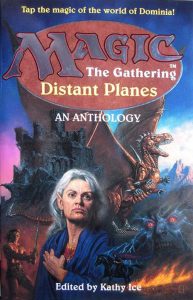 Excerpt from the Edd Vick interview, conducted by D. Blake Werts, from The Digest Enthusiast book six:
Excerpt from the Edd Vick interview, conducted by D. Blake Werts, from The Digest Enthusiast book six:
“I co-edited and published Comics Fandom Examiner for a few years with Jeff Wood, Hal Hargit, and Wade Busby, all primarily small press creators. Through Comics F/X I met a lot of really great cartoonists, and published alternative comics from 1990 through 2005. Brad Foster convinced me I had to use the same name for the company as my first fanzine, so it became Miscellania Unlimited Press, more commonly known as MU Press. The sales plummeted in the last five years of MU’s existence, and I got re-interested in writing again. My wife, the SF author Amy Thomson, was invited into an anthology of stories set in the Magic: the Gathering universe, and I sort of invited myself along for the ride, writing a short story called “Defender” that the editor thought good enough to include. That anthology was published in 1996.”
